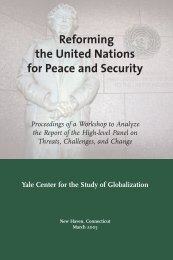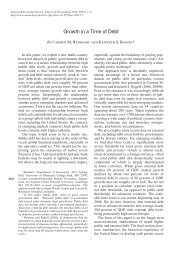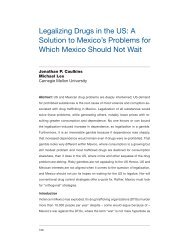The collapse of global trade, murky protectionism, and the crisis:
The collapse of global trade, murky protectionism, and the crisis:
The collapse of global trade, murky protectionism, and the crisis:
Create successful ePaper yourself
Turn your PDF publications into a flip-book with our unique Google optimized e-Paper software.
1. Protectionism <strong>and</strong> <strong>the</strong> <strong>global</strong> economic<br />
<strong>crisis</strong> – <strong>the</strong> role <strong>of</strong> <strong>trade</strong> in <strong>the</strong> response<br />
Simon Crean<br />
Australia's Minister for Trade<br />
We see around us evidence <strong>of</strong> a rolling economic <strong>crisis</strong>, spreading <strong>and</strong> deepening<br />
across <strong>the</strong> <strong>global</strong> community. What started in <strong>the</strong> financial sector has moved into <strong>the</strong><br />
real economy, forcing company closures <strong>and</strong> significant job losses. No country is<br />
immune from <strong>the</strong> fallout. A <strong>global</strong> response is required.<br />
International <strong>trade</strong> is one <strong>of</strong> most important arenas in which we must combat <strong>the</strong><br />
real effects <strong>of</strong> this <strong>crisis</strong>. Trade is itself a stimulus. World <strong>trade</strong> grows faster than world<br />
output. Each successful multilateral <strong>trade</strong> Round has exp<strong>and</strong>ed <strong>trade</strong> growth.<br />
Preserving open <strong>trade</strong> flows must be a central part <strong>of</strong> our policy response to <strong>the</strong> economic<br />
<strong>crisis</strong>. If it is not, we will be losing a significant opportunity to reinforce o<strong>the</strong>r<br />
expansionary fiscal <strong>and</strong> monetary policy measures taken by governments. If <strong>the</strong><br />
world turns inwards on <strong>trade</strong>, we will be undermining those very same expansionary<br />
efforts.<br />
Trade is <strong>the</strong> mechanism through which growth <strong>and</strong> prosperity are transmitted<br />
between countries. Every day billions <strong>of</strong> dollars <strong>of</strong> goods <strong>and</strong> services are bought <strong>and</strong><br />
sold around <strong>the</strong> world, giving consumers access to new products <strong>and</strong> generating<br />
wealth <strong>and</strong> prosperity for <strong>the</strong> people <strong>and</strong> businesses that make <strong>the</strong>m. According to<br />
OECD analysis, a 10% increase in <strong>trade</strong> is associated with a 4% rise in per capita<br />
income.<br />
Unfortunately, however, <strong>the</strong> <strong>crisis</strong> we now face has thrown this process into<br />
reverse. World <strong>trade</strong> flows are falling, forcing businesses to close <strong>and</strong> threatening to<br />
drive millions into poverty. According to <strong>the</strong> World Bank, 2009 will be <strong>the</strong> first year<br />
in over a quarter century 1 in which international <strong>trade</strong> is forecast to fall.<br />
<strong>The</strong> latest forecasts from <strong>the</strong> IMF are for world <strong>trade</strong> volumes to fall by 2.8% this<br />
year. In some parts <strong>of</strong> <strong>the</strong> world, <strong>the</strong> impact is much greater. Already, we have seen<br />
that <strong>the</strong> value <strong>of</strong> China's exports fall by 18% in January (year-on-year). Japan's<br />
exports fell 47%. We need to halt <strong>the</strong>se falls <strong>and</strong> ignite a 'positive feed-back loop' in<br />
which increased <strong>trade</strong> stimulates growth <strong>and</strong> growth drives increased <strong>trade</strong>.<br />
One thing is clear: <strong>protectionism</strong> is not <strong>the</strong> answer. In fact, <strong>protectionism</strong> is a misnomer.<br />
In <strong>the</strong> long run it protects nothing, but erodes competitiveness, growth,<br />
employment <strong>and</strong> real incomes. This has never been more true than it is now. A titfor-tat<br />
spiral into <strong>protectionism</strong> would be self-defeating <strong>and</strong> would only exacerbate<br />
<strong>the</strong> <strong>global</strong> downturn.<br />
This is ano<strong>the</strong>r reason for us to conclude <strong>the</strong> WTO Doha Round, which would be<br />
our best insurance against <strong>the</strong> risk <strong>of</strong> renewed <strong>protectionism</strong>. We forget that if all<br />
nations raise <strong>the</strong>ir tariffs to <strong>the</strong>ir bound rate (<strong>the</strong> highest rate consistent with <strong>the</strong>ir<br />
WTO commitments), exporters from middle <strong>and</strong> high income countries could face<br />
tariffs twice as high as current levels. A recent paper by IFPRI estimates that <strong>the</strong> costs<br />
to world <strong>trade</strong> flows <strong>of</strong> a <strong>global</strong> resort to <strong>protectionism</strong> (where tariffs rise to <strong>the</strong>ir his-<br />
1 <strong>The</strong> Bank has noted that <strong>global</strong> <strong>trade</strong> is forecast to shrink in 2009 for <strong>the</strong> first time since 1982. See<br />
http://www.worldbank.org/html/extdr/financial<strong>crisis</strong>/.<br />
13





